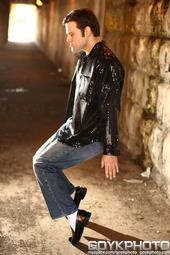In December 2003, the cover of Rolling Stone declared Justin Timberlake The New King of Pop. To some, it was an affirmation. To Sean Bos – just plain insult, for that title should have been his – but had now slipped away through years of procrastination and lack of dedication. Now, as this year comes to a crossroads – so is the once-promising career of Sean Bos.
When he snapped his fingers back and forth and pointed to the ground with the gloved left hand, you knew he was up to no good. Michael Jackson – Sean Bos. One could hardly think of one without the other. In an age (1995-1999) when acts such as Dave Matthews Band, Smashing Pumpkins, Pearl Jam, and Phish were influencing underground acts, Sean Bos was the notorious and accepted exception to the rule.
The Chicago native eccentricity became The University of Dayton's unquestioned King of Pop in the fall of 1995. With his trademark necktie under the collar around his neck, fedora, white socks, penny loafers, sleeve cuffs unbuttoned, and occasional sporting of a winter glove, Bos had an uncanny ability to copy traits of his musical mentor, and at the same time create his own patented style. He could do a spin or kick with the musical instincts of only one other human being. And who else had the audacity to turn a beer-flooded basement into a scene from the dark streets of Billie Jean on a moment's notice? So lonely without the spotlight, yet so embarrassed by praise and undaunted by adversity.
In 1998, Bos released his first album, "Redemption." It captured the imagination of thousands of students at Dayton, those back home in Chicago, throughout the Midwest, and even a few small European circles. The 8-song cover album included remakes of songs made by George Michael, Patti LaBelle, John Mellencamp, Stevie Wonder, and of course, Michael Jackson. In addition, there was Bos' first original song , Back On Track, with vocals dubbed over the instrumental version of Soul For Real's Everything Little Thing I Do. But for as much additional notoriety and fanfare that came with Redemption, it could hardly be described as flawless. With little time and less money, Bos was unable to produce the album to its potential.
The summer of 1998 proved to be pivotal. That's when Bos got the inspiration for the follow-up 8-song album Nuclear On The Dance Floor. Released in February 1999, it showed his coming of age in production and lyric writing. There was the fan favorite Jerry Springer Rap, a humorous tune paying homage to the show. There was Jenny Dean, along with the song Nuclear On The Dance Floor, which displayed for the first time a Bos original melody.
In the spring of 2002, Bos released his only post-90s (and by the way BEST) single to date, Still Blow Your Mind. With a driving beat and hearthrobbing bass, it reminded us of the talent and raw emotion Sean Bos can bring to the table and that he can, if he wants to, play with some of the big boys in this era.
Now as he embarks upon his first serious effort of the 21st century, Bos promises to be more user-friendly and accessible to the public. But the landscape has changed now – the type of music he specializes in has only gotten older. It will be up to him to satisfy his spirit while at the same time appealing to an audience that has grown progressively distant from his heyday of the 90s (or 80s, depending onhow you look at it). An old dream to follow in the footsteps of his musical idol will get one more chance.
Is Bos ready for a head-on collision with the new world of American Idol, myspace, and text messaging? Perhaps the larger question: Are we ready for him? The quest to return the title of New King of Pop back to its rightful owner begins now. Ladies and gentlemen ... Sean Bos.
-Shawn Hall
Layout by CoolChaser
